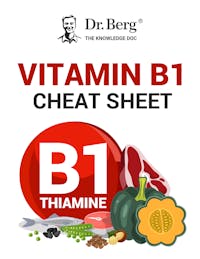The Hidden Deficiency in POTS or Postural Orthostatic Tachycardia Syndrome

Vitamin B1 Cheat Sheet
Learn about the essential functions and benefits of vitamin B1
Understand the role of vitamin B1 in energy production and brain health
Recognize early signs and common causes of vitamin B1 deficiency
Discover the best dietary sources of vitamin B1
Get expert guidance on why avoiding synthetic vitamin B1 supplements is crucial

Vitamin B1 Cheat Sheet
Learn about the essential functions and benefits of vitamin B1
Understand the role of vitamin B1 in energy production and brain health
Recognize early signs and common causes of vitamin B1 deficiency
Discover the best dietary sources of vitamin B1
Get expert guidance on why avoiding synthetic vitamin B1 supplements is crucial

Vitamin B1 Cheat Sheet
Learn about the essential functions and benefits of vitamin B1
Understand the role of vitamin B1 in energy production and brain health
Recognize early signs and common causes of vitamin B1 deficiency
Discover the best dietary sources of vitamin B1
Get expert guidance on why avoiding synthetic vitamin B1 supplements is crucial

Vitamin B1 Cheat Sheet
Learn about the essential functions and benefits of vitamin B1
Understand the role of vitamin B1 in energy production and brain health
Recognize early signs and common causes of vitamin B1 deficiency
Discover the best dietary sources of vitamin B1
Get expert guidance on why avoiding synthetic vitamin B1 supplements is crucial

Vitamin B1 Cheat Sheet
Learn about the essential functions and benefits of vitamin B1
Understand the role of vitamin B1 in energy production and brain health
Recognize early signs and common causes of vitamin B1 deficiency
Discover the best dietary sources of vitamin B1
Get expert guidance on why avoiding synthetic vitamin B1 supplements is crucial

Vitamin B1 Cheat Sheet
Learn about the essential functions and benefits of vitamin B1
Understand the role of vitamin B1 in energy production and brain health
Recognize early signs and common causes of vitamin B1 deficiency
Discover the best dietary sources of vitamin B1
Get expert guidance on why avoiding synthetic vitamin B1 supplements is crucial

Vitamin B1 Cheat Sheet
Learn about the essential functions and benefits of vitamin B1
Understand the role of vitamin B1 in energy production and brain health
Recognize early signs and common causes of vitamin B1 deficiency
Discover the best dietary sources of vitamin B1
Get expert guidance on why avoiding synthetic vitamin B1 supplements is crucial

Vitamin B1 Cheat Sheet
Learn about the essential functions and benefits of vitamin B1
Understand the role of vitamin B1 in energy production and brain health
Recognize early signs and common causes of vitamin B1 deficiency
Discover the best dietary sources of vitamin B1
Get expert guidance on why avoiding synthetic vitamin B1 supplements is crucial

Vitamin B1 Cheat Sheet
Learn about the essential functions and benefits of vitamin B1
Understand the role of vitamin B1 in energy production and brain health
Recognize early signs and common causes of vitamin B1 deficiency
Discover the best dietary sources of vitamin B1
Get expert guidance on why avoiding synthetic vitamin B1 supplements is crucial
Have you heard of Postural Orthostatic Tachycardia Syndrome (POTS)? This condition makes it challenging to tolerate positional changes, like standing up quickly. What if there was a surprising nutritional link?
This article explores the potential connection between POTS and vitamin B1 deficiency and how this vitamin could be a game-changer for those seeking answers.
POTS: A Closer Look
Imagine lying down, feeling relaxed. You decide to stand up, and suddenly, your heart starts racing. Dizziness washes over you, your vision blurs, and you feel faint. This is a glimpse into the daily reality of many individuals with POTS.
Often misdiagnosed, POTS can significantly impact a person's quality of life.
Symptoms and Misunderstandings
Beyond the hallmark symptom of lightheadedness upon standing, POTS often presents other debilitating symptoms. These symptoms are similar to those experienced by individuals with tachycardia syndrome.
Many POTS patients experience tachycardia syndrome-like symptoms such as fatigue and brain fog.
Because the symptoms are so varied, pinpointing POTS can be tricky, even for experienced medical professionals. This is where understanding potential underlying factors, like a possible POTS vitamin B1 deficiency, becomes essential.
Vitamin B1: An Unsung Hero?
Let's talk about vitamin B1, also known as thiamine. You may know it plays a role in energy production. However, were you aware of its connection to nerve function? Thiamine is especially vital to the autonomic nervous system.
This system controls automatic bodily functions such as heart rate, digestion, and blood pressure regulation, all things that go awry with POTS.
Bridging the Gap: From Beriberi to POTS Vitamin B1 Deficiency?
The condition called beriberi, a severe thiamine deficiency, presents symptoms eerily similar to POTS: fatigue, weakness, and even neurological problems.
While full-blown beriberi is rare in developed countries, could mild deficiencies be playing a hidden role in some POTS cases?
This possible connection is a question worth pondering. Additional symptoms associated with beriberi include vasovagal syncope, a condition also commonly observed in POTS patients.

Stress, Diet, and Depletion
Many factors can contribute to vitamin B1 depletion. Some are environmental, others dietary, but all revolve around increased demand or impaired absorption of this vital nutrient.
Here are common factors that may contribute to vitamin B1 depletion:
Chronic stress (yes, stress depletes crucial nutrients)
High sugar intake (think processed foods, refined grains – these require extra B1 to metabolize)
Alcohol consumption
Addressing these lifestyle factors may help support overall health. It also ensures the body has what it needs to utilize B1 effectively. It’s not just about putting it in; it's about making sure your body can use it.
POTS Vitamin B1 Deficiency: The Potential Connection
While more research is needed, some evidence suggests a potential link between POTS and vitamin B1 deficiency. One small study found that thiamine supplementation helped to improve symptoms in some individuals with the condition.
Findings like this have encouraged healthcare providers to incorporate thiamine as part of a holistic approach for their POTS patients.
It’s important to remember that everyone is unique, and there is no one-size-fits-all solution. While there is anecdotal evidence linking POTS and vitamin B1 deficiency, remember this is still an area requiring further research to establish a firm connection.
However, thiamine deficiency can certainly worsen symptoms similar to POTS, adding another layer of complexity. This potential connection further emphasizes the need to rule out any nutritional deficiencies through proper testing and work alongside your healthcare provider.
Could This Be the Missing Piece for You?
Consider this: If you suspect a nutrient deficiency might be contributing to your symptoms, speaking with your doctor is crucial. They can help order specific tests – like the erythrocyte transketolase activity assay – that evaluate how your body uses thiamine.
Together, you can discuss whether addressing a potential POTS vitamin B1 deficiency through diet or targeted supplementation is right for you.
Empowering yourself with knowledge and working alongside a knowledgeable healthcare provider could make a world of difference on your journey back to optimal well-being.

Unraveling Health Mysteries
Delve into the complex interplay between vitamin B1 (thiamine) deficiency and its impact on health, particularly in relation to Postural Orthostatic Tachycardia Syndrome (POTS).
Thiamine deficiency can lead to symptoms such as fatigue, muscle weakness, and neurological issues, which can exacerbate the challenges faced by those with POTS.
Addressing this deficiency through dietary changes or supplementation can significantly improve symptoms and overall well-being. However, as the body begins to heal, some individuals may experience a temporary worsening of symptoms known as the Herxheimer Effect.
This reaction occurs as toxins are released during the die-off of harmful bacteria, leading to short-term discomfort before improvement is noticed.
By understanding the role of vitamin B1 in health and recognizing the potential for the Herxheimer Effect, individuals can better navigate their journey towards improved health and symptom management.
Conclusion
As we've explored, the connection between POTS and vitamin B1 deficiency remains an intriguing area for continued research. While POTS is complex, and the cause often remains elusive, the impact of nutrients like vitamin B1 deserves our attention.
Addressing potential deficiencies as part of a broader, holistic approach may be a vital piece of the puzzle for those struggling with this condition. Always remember to consult your doctor before making any changes to your healthcare regimen.
Previous blog
What is De Novo Lipogenesis
Popular
08/21/2024
55.7K views
02/23/2025
46.8K views
11/18/2024
281.2K views
03/18/2024
11/21/2022




